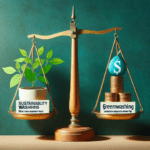
**What is Sustainability Washing? A Critical Analysis**
In an era of increasing environmental awareness and demand for more sustainable business practices, the term “sustainability washing” has emerged as a sort of wake-up call. This phenomenon describes the tendency of some companies to present their practices as more environmentally friendly than they actually are, using vague and ambiguous communication. The goal is obviously to attract consumers who are increasingly sensitive to environmental issues and who seek products and services that respect the planet.
Companies involved in sustainability washing often use generic phrases and eco-friendly terminology without providing concrete data or tangible demonstrations of their actual commitments. Such an approach may include catchy slogans, green labels, and sustainability promises that are not backed by real actions. However, this kind of approach is not only misleading but can also have counterproductive consequences, disappointing customers and undermining trust in brands.
Recent studies reveal that a significant percentage of consumers are now skeptical of these practices. Many Italians, for example, view sustainability not as a genuine ethical commitment but as a commercial strategy to justify higher prices or to embellish products that would otherwise go unnoticed. This skepticism is a wake-up call for companies, which must confront the risk of alienating an increasingly aware and informed customer base.
**The Repercussions of Sustainability Washing**
Excessive and misleading communication regarding ecological commitments can generate a backlash among consumers. Instead of attracting new customers, sustainability washing can drive existing ones away, who, frustrated by the lack of consistency between words and actions, may decide to turn to more credible alternatives. The loss of trust is a critical factor that can influence purchasing decisions, leading consumers to disengage from environmental issues.
In a business context where consumers are becoming increasingly informed, companies must learn to navigate cautiously. Transparency has become a fundamental value: customers want to know exactly which sustainable practices are being adopted and how these translate into concrete actions. Simply labeling a product as “green” or “eco-friendly” is no longer sufficient to meet authenticity criteria in the eyes of consumers.
**A Call for Transparency**
To combat the phenomenon of sustainability washing, it is essential for companies to adopt a more authentic and transparent approach. This entails clear communication regarding production processes, the raw materials used, and the environmental impacts of their products or services. Companies should not only promote their green initiatives but also demonstrate their commitment through tangible data and credible sustainability reports, updated regularly.
Furthermore, collaboration with qualified third-party organizations can be an effective way to validate their sustainability claims. Recognized certifications and independent audits can provide consumers with the assurance that they can trust the information provided. It is in this context that true sustainability can become a competitive advantage, ensuring that companies not only meet consumer expectations but also contribute to real global change.
**Conclusion**
In a world where sustainability is increasingly in the spotlight, it is vital for companies to understand the importance of genuine commitment. The path to true sustainability lies in transparency, consumer education, and a real change in business practices. The deceptions of sustainability washing not only harm brand reputation but also turn customers away from the green cause.
We therefore invite our readers to reflect and further educate themselves on these topics by following us on our social media profiles. Together, we can contribute to greater awareness and a more sustainable future.


